Are you planning on doing any work on your home’s electrical system? If so, the first thing you must do is determine whether you need an electrical permit. You also need to find out if it’s something you can legally do yourself or if you must hire a licensed electrician.
At GVEC Electrician Services, we’re familiar with all relevant codes in DeWitt, Gonzales, Lavaca, Wilson, Comal, Bexar, Hays, and Guadalupe Counties. In this article, we’ll explain the permit requirements for electrical work and the rules governing DIY work in Texas.
What Type of Electrical Work Requires a Permit?
The rules for when you do and don’t need an electrical permit in Texas vary a bit from city to city and county to county. As such, it’s important to check with your local municipality if you’re unsure whether you need a permit for your planned work.
Permits are generally never required when performing minor work or repairs, such as replacing an outlet, switch, or light fixture. Other than that, most places require a permit for almost all other types of electrical work. This includes making changes to the existing electrical system, such as rewiring a circuit or upgrading the electrical panel. You also typically need a permit when adding to the electrical system, such as installing an additional circuit, outlets, or lighting.
An Overview of Homeowner’s Permits
Only licensed electricians can receive a standard electrical permit in Texas. However, many places have an exemption for homeowners who want to do work on their house’s electrical system themselves. In this case, you need to apply for and receive a homeowner’s permit to do the work legally. This type of permit is required for all the same types of work as a standard electrical permit.
You must also meet the same requirements with a homeowner’s permit as a standard permit. That means submitting a plan to the local permit office showing the scope of the proposed work and then getting everything inspected by the local building office once the work is complete. The inspector will check that the work was done correctly and meets the electrical code requirements. If everything doesn’t conform to code, you’ll have to fix whatever issues there are before you can pass the inspection. In cases of a significant safety hazard, the inspector could deem that your house isn’t safe to occupy until the problem is fixed.
Potential Consequences of Failing to Get an Electrical Permit
Failing to get either a standard electrical permit or a homeowner’s permit can have substantial consequences. Working on an electrical system without the required permit is illegal and can result in a hefty fine. In some cases, you could still be forced to pay for the permit and then have the work redone by a licensed electrician.
If you do any DIY electrical work without a permit and it leads to an issue such as a fire, your homeowner’s insurance will likely deny your claim. That means you’d then need to pay to repair the damage yourself. Even worse is if your home were to burn down, as you’d then be out the entire cost of the house.
Another concern with not getting a permit is that it can create major hassles when trying to sell the home. For starters, work that doesn’t meet code will almost always lower the value of your house. Prospective buyers could also say that you need to have the work redone by a licensed electrician as a condition of them closing on the house. Alternatively, they may require you to put the money to fix the issues in escrow.
Why Hiring a Licensed Electrician Is the Best Option
Even if you can receive a homeowner’s permit for your planned project, the safest and thus best option is to hire a licensed electrical contractor. Doing any DIY electrical work, even something basic like replacing an outlet, is always a bad idea due to the various risks involved.
Improper wiring is a serious safety concern, as it can result in an electrical fire or someone getting shocked or electrocuted. An improperly installed outlet may also end up short-circuiting, leading to a major power surge that damages or destroys whatever is plugged into the outlet. Issues like short-circuiting or an arc fault can damage other things on the same circuit or some of the circuit’s wiring.
Hiring a licensed electrician gives you the peace of mind knowing that the work will be done correctly and according to electrical code requirements. The electrical company’s insurance will also pay out if the work wasn’t done correctly and it resulted in damage to your property.
When you need an experienced, licensed electrician in Gonzales, TX, or anywhere in South Central Texas, GVEC Electrician Services is the company to rely on. Our team has years of experience and will take the time to handle your project safely and correctly. To schedule a consultation for your electrical project, contact us today.



